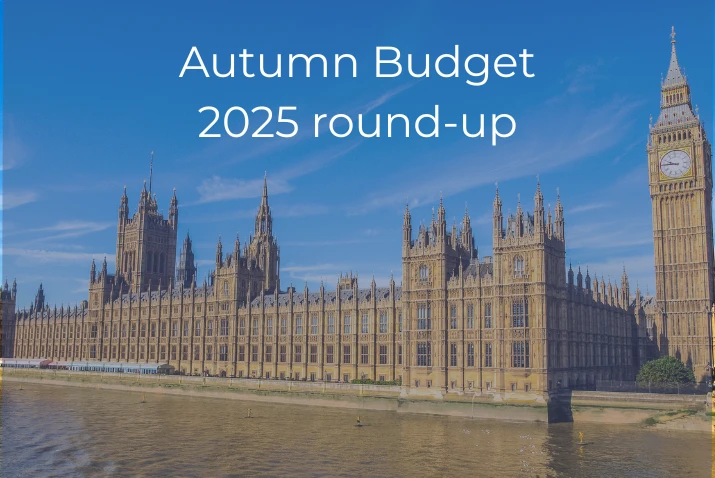Budget headlines for the property sector:
• Landlords and property investors are the most directly affected, with slightly higher tax on rental income and frozen tax thresholds.
• Very high value homeowners (£2m+) face a new recurring annual charge from 2028.
• Renters don’t see direct tax changes, but may end up paying more in rent due to increased costs for landlords, while tenants on benefits or low incomes get a boost.
The Autumn budget, announced by the Chancellor, Rachel Reeves, was probably the most publicised in the history of recent government. Worse still, albeit the fault of the Office of Budget Responsibility, their analysis of the budget was published in advance of the Chancellor standing up and presenting it in parliament.
This resulted in the Deputy Speaker announcing that the early release of information had reached unprecedented levels and represented a "supreme discourtesy" to the House of Commons.
Nevertheless, despite all the noise, rhetoric and fear – and while there will be some impact on those that invest in property or own properties valued at more than £2mn – the budget hasn’t hit everyone as hard as expected.
And, if the budget delivers what it claims and reduces inflation, this could actually help put more money into people’s back pockets. A drop in inflation could enable the Bank Base Rate to fall – hopefully as soon as the next Monetary Policy Committee meeting on 18th December – which would facilitate a reduction in mortgage costs for those owning a property.
What are the key changes from the Autumn Budget that will impact the property market?
For a property market to thrive, we need economic growth, low interest rates (which help to reduce mortgage costs) and a reduction in the cost of living to help tenants and those on benefits.
Will the Autumn Budget reduce inflation?
Inflation is likely to average at 3.5% this year, but is expected to fall to 2.5% in 2026, much closer to the Treasury’s target of 2%. The changes in the budget are predicted to reduce inflation by 0.4%, quite a substantial amount.
If inflation continues to fall, we can expect the Bank will further reduce the base rate, which in turn drives lower mortgage rates; benefiting both new and existing borrowers.
“Confidence is what drives the mortgage market, and that is shaped by the wider economic picture. Interest rate cuts earlier this year, followed by lower, more stable mortgage pricing and improved affordability policy, have created a more predictable foundation for buyers to plan against.” - Tom Davies, Group Financial Services Managing Director at our sister company, Mortgage Scout
How will the Autumn Budget impact tenants?
Overall, those on benefits, receiving a pension or on a minimum/low wage should benefit from the changes in this budget, especially those with more than two children who will have the benefit cap lifted.
The biggest benefit will be felt by the 20%+ of tenants renting in the Private Sector who have had their Local Housing Allowance top-up capped and have more than two children - although that won’t take effect until April 2026.
Tenants on minimum wage or living wage will benefit from increases of 4% for those ages between 18 and 20, and 8.5% for others. Both of these represent real increases above the rate of inflation, on top of last year’s increases, so they will be very helpful in reducing the cost of living crisis for affected tenants.
It’s worth noting that tenants will also benefit from the implementation of measures in the Renters’ Rights Act (RRA) from May 1st next year. Landlords will need to give justified/valid reasons to gain possession - albeit this effects less than 1 in 10 tenants – and rents will only be able to be increased once a year, in line with market value.
What we need to see is how landlords react over the coming months to the RRA changes. Will they be more likely to sell, or more likely to increase rents now while they have the chance, particularly those that have typically charged below market rates?

How will the Autumn Budget impact first-time buyers?
This is the second budget in a row where there doesn’t seem to be a drive to help support FTBs – something that has always tended to feature in budgets in the past.
This may be due to the fact that we are still waiting for the Government to issue its overarching Housing Strategy paper.
Disappointingly, the Chancellor did little to change the status of Shared Ownership within the government’s housing policy.
Peter Hawley, Director of our sister company SOWN, says: “Shared Ownership bridges the gap between renting and full ownership for those who earn too much for social housing yet too little to buy outright. It helps people build equity, supports mixed communities and does so at a fraction of the cost of traditional subsidy. Yet it barely features in current policy documents and is all but invisible in the National Planning Policy Framework."
Among other things, he recommends updating income thresholds to reflect real markets, given that in many higher value areas, including much of the South East, even buying a 25 per cent share of a modest home is now out of reach.
“A more flexible system that uprates thresholds and allows regional variation would keep Shared Ownership focused on those who need help most, without shutting out the “missing middle” of would-be buyers.”
In addition, looking closely at the budget detail, a consultation of the current Lifetime ISA was announced, but this is unlikely to impact until late next year if not 2027.
Nevertheless, it is still quite a good time for FTBs to buy a home right now. Property prices aren’t rising significantly in most areas, and in many locations - particularly the more expensive ones, such as London, Reading, Cambridge and Gloucester - prices are lower today than they were in 2022. Given that wages have been rising in excess of inflation for several years, this is improving affordability.
If the budget delivers on its aim to reduce inflation through cost cutting methods on energy, fuel and rail charges, this will hopefully lead to the reduction in Bank Base Rate from its current 4%. If that allowed FTBs to access mortgage rates of 4% or lower, this rise in affordability could well help to boost the number of people buying their first home.
If you are not currently on the property ladder and are thinking of buying, it’s definitely worth investigating your options by consulting a mortgage broker.
How will the Autumn Budget impact ‘second steppers’ and people trading down?
This budget doesn’t really affect most ‘second steppers’, other than reducing their level of affordability due to the continued freezing of income tax thresholds.
That said, if the budget helps drive down inflation, the upside of lower mortgage rates could negate or even surpass the impact of income tax thresholds. And with property price inflation lower than inflation itself, this is still a good time to buy and sell.
For most people trading down, the likelihood is they won’t have a mortgage to worry about, but they also won’t necessarily be affected by the Government freezing income tax thresholds. A fairly stagnant market means they can take their time to sell and buy.
How will the Autumn Budget impact high-value home owners/buyers?
If you are buying or own homes worth in excess of £2 million, you need to know that an additional annual ‘mansion tax’ will apply from 2028. It will start at 2,500 for properties worth £2m to £2.5m, rising to £7,500 for homes valued at £5m or more.
Although this is only expected to directly affect 1% or less of homeowners, it is likely to have an impact on homes valued around the different thresholds if prices are reduced to help negate or reduce the annual bill incurred. However, the government plan is to do a valuation of properties in 2026, so we will keep an eye for how this is going to work.
Mansion Tax Surcharges
£2 million to £2.5 million - £2,500
£2.5 to £3.5 million - £3,500
£3.5 to £5 million - £5,000
Over £5 million - £7,500

How will the Autumn Budget impact landlords and property investors?
The last two budgets have made it clear that the Government intends to rebalance the tax paid by those who earn their income differently – be it through rent, dividends, or other saving or investment vehicles.
The rumour that landlords might need to pay National Insurance on rent received wasn’t introduced, but for those earning rent from property or income from dividends or savings, the tax rate will increase by 2%. That means the basic rate will rise from 20% to 22%, and the higher rates from 40% to 42% and 45% to 47%.
These increases won’t apply though until April 2027.
Allison Thompson, our National Lettings Managing Director, comments: “For landlords, the biggest change is the rise in income tax rates applied specifically to property income. From April 2027, rental profits will be taxed at higher rates than today, which adds to the financial pressures already created by the Renters’ Rights Act and wider regulatory reform. This affects individuals who hold their investment properties in their own names, rather than through a company structure. For anyone in that position, it is worth taking a fresh look at how their portfolio is structured and whether it still serves their long-term plans.”
Do bear in mind, though, that Capital Gains Tax for property for higher rate payers was reduced from 28% to 24% in the last budget. This means landlords can still earn good returns from legally and safely let property – albeit by making a long-term investment.
Where investors will really be able to benefit is from the huge public spending on local projects, such as new towns, which are expected to be built in Tempsford, Leeds South Bank and Crews Hill & Chase Park.
In addition, increased funding to support housebuilding in specific areas will result in more new homes being delivered in Manchester, London, Liverpool City Region, the North East, South Yorkshire, West Midlands and West Yorkshire.
Finally, those who are currently or have been in the armed forces could also see some benefit from the announcements made in this Budget, with the release of MoD land intended to support more homes for those in and retired from service.
In summary
Overall, the budget didn’t give many direct hits to boost or reduce property market activity. However, the support of the economy, together with the much-hoped-for subsequent mortgage rate falls, could help balance buyer and seller demand moving into 2026 and deliver a good market for everyone next year.
However, for those with more expensive homes and for property investors, it would be wise to chat through the impact of the budget with a financial adviser prior to Christmas.








